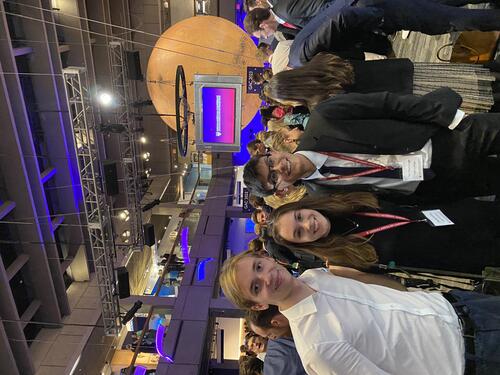
Yale College Political Science student Tim Yuen Lingk ‘25 attended the German American Conference (GAC) at the Harvard Kennedy School in Boston in October 2023.
Thanks to the European Studies Fellows grant, I was able to attend the GAC 2023 at Harvard Kennedy School. The conference brought together a group of distinguished experts in transatlantic relations and attendees from the United States, Germany, and beyond. The keynote speeches, panels, workshops, and networking events all allowed me to gain new academic and industry insights on the state of German-American friendship and future opportunities for transatlantic relations. It also enabled me to connect with other Germans studying at universities in the United States and discuss how we can individually contribute to the continuation of this bilateral friendship.
One of my conference highlights was a workshop with five women’s rights activists on feminist foreign policy. The workshop intervened in the dominant narratives of security discourse and asked how the U.S., Germany, and countries around the world can center women and children in their approaches to conflict resolution and peacebuilding. I was lucky to speak with Foteini Papagioti of the International Center For Research On Women, which developed a methodology to evaluate and track countries’ standing on feminist foreign policy. This workshop also shed a new light on another panel of the conference, “Reporting on War.” In this panel, two journalists shared their personal experience reporting on the war in Ukraine from the ground. Both these events helped me sharpen my human rights perspective on the military cooperation between the U.S. and Germany.
Another theme of the conference was emerging technologies and Germany’s as well as the U.S.’s role in facilitating yet regulating the development and deployment of these technologies. The workshop “Having Better Policy Conversations About AI” gave me a concise foundational understanding of AI and its various sub-fields. It also allowed me to better assess what technical knowledge I need or don’t need to meaningfully contribute to policy conversations about AI. On the topic of technology, I also attended a panel on “The Future of Digital Advocacy” and a workshop with the German media channel “Funk” on “Innovation in Media.” These two events compared the media landscapes in the United States and Germany and sparked generative conversations about (social) media’s potential and responsibility to fight misinformation and disinformation. For instance, I learnt that Funk’s strategy is to package its news as entertainment so that German youth continues to engage with it. Funk discussed how they have to come up with alternative strategies when an entertaining packaging feels inappropriate, like in the case of the war in Israel and Palestine.
Finally, the conference emphasized economic relations and business opportunities in the transatlantic region. Thanks to the panel “Can ESG transform the world of business?,” I got to ask Georg Kell, the founder of the UN Global Compact, about the potential of the ESG framework as a “floor” for human rights. For my own career, the panel “Career Paths Beyond Sectors” encouraged me to seek out tri-sectoral competence.
In his remarks, the German Ambassador to the United States, Andreas Michaelis, highlighted that the GAC is one of the most important annual events for the German and American public to appreciate and rethink their relationship. I was thrilled to have had the opportunity to be part of such a special occasion, and I’d like to express my gratitude to the European Studies Council at the Yale MacMillan Center for their generous support.

